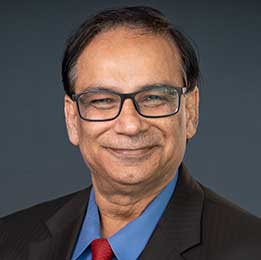
Salim Surani, MD, MSc, FCCP

Salim Surani, MD, MSc, FCCP
While all attendees of CHEST 2025, held October 19 to 22, in Chicago, will have the opportunity to explore a comprehensive curriculum packed with the most current research and clinical practice updates, those specializing in chest infections, disaster medicine, and systemic disease have a particularly robust schedule ahead of them.
“A kaleidoscope” is how Salim Surani, MD, MSc, FCCP, long-time CHEST Annual Meeting attendee and Chest Infections, Disaster Medicine, and Systemic Disease Curriculum Group Lead, described this year’s offerings.
Whether an attendee is an early career specialist or a seasoned clinician managing complex cases in the ICU, they are bound to find something applicable to their area of expertise and interest.
Discover the latest in chest infections management
CHEST draws a wide range of providers, but Dr. Surani specifically highlighted the important role that advanced practice providers (APPs) play due to their frequent encounters with patients who present the most common symptoms of chest infections: cough and dyspnea. “We are all busy, and we don’t always have the time to stay up to date on a wide range of topics,” Dr. Surani admitted. “CHEST is where you go to get all your updates in one shot.”
KEY SESSION
The Benefits of APPs Working With Physicians in the ICU
APPs provide high-quality and cost-effective care in ICUs. Their scope and utilization, however, vary widely. This session will review current evidence about their integration into the ICU, insights into optimal workflows, billing practices, and their role as both teachers and learners within academic health systems.
Disaster response, climate change, and pulmonary health
Increasingly severe and unpredictable climate events have created a new urgency in clinical training. “Climate change is a very controversial topic,” acknowledged Dr. Surani, but recent wildfires have made several CHEST 2025 sessions especially relevant. Attendees are encouraged to investigate sessions that explore topics such as clean air legislation, hyperlocal sustainability, and natural disaster provider response.
KEY SESSION
Climate Change and the Rising Burden of Pulmonary Disease
Rising temperatures and increased incidence and severity of wildfires contribute to worsened air quality, exacerbating respiratory conditions such as asthma, COPD, and lung infections. This session will explore the intersection of climate change and pulmonary health and offer a deeper understanding of these complex challenges and the threat they pose to lung health.
Challenges around treating systemic disease
Clinicians who find themselves at the intersection of complex systemic conditions and respiratory care are urged to explore sessions on topics such as complications of autoimmune diseases, sarcoidosis management, and interstitial lung diseases. These sessions will offer new insights into diagnostic challenges, treatment strategies, and multidisciplinary approaches to care, making them especially relevant for those managing patients with overlapping systemic and pulmonary conditions in both inpatient and outpatient settings.
KEY SESSION
Sepsis in the Immunocompromised Patient: Updates in Diagnosis and Management
The population with compromised immune systems is growing due to increased solid organ transplantation, hematopoietic stem cell transplants, and improved survival rates. These patients face a high risk of infections, potentially leading to sepsis. This interactive session aims to equip clinicians with key principles for the diagnosis and management of sepsis.
From breakthrough therapies to artificial intelligence and practice management strategies, Dr. Surani put it simply: “If you want to know what those are, come to CHEST.”
READ ALL CHEST 2025 BLOGS »